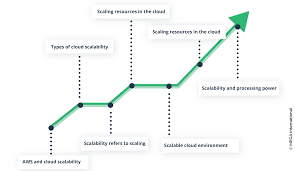
Unlocking Business Success Through Scalability Strategies
The Importance of Scalability in Business
Scalability is a crucial factor for businesses looking to grow and adapt to changing market conditions. In simple terms, scalability refers to the ability of a system, network, or process to handle an increasing amount of work or its potential to accommodate growth.
Businesses that prioritize scalability can easily adjust their operations to meet changing demands without compromising efficiency or performance. This flexibility allows companies to seize new opportunities, expand their customer base, and stay ahead of the competition.
Key Benefits of Scalability:
- Flexibility: Scalable businesses can easily scale up or down their operations based on market needs without incurring significant costs or disruptions.
- Cost-Efficiency: Scalability enables companies to optimise resource allocation and avoid unnecessary expenses by adjusting their capacity as needed.
- Improved Performance: Scalable systems are designed to maintain high performance levels even under increased workloads, ensuring consistent service quality for customers.
- Growth Opportunities: Scalable businesses are well-positioned to capitalise on growth opportunities and expand into new markets without constraints.
Strategies for Achieving Scalability:
To enhance scalability, businesses can implement the following strategies:
- Adopt Cloud Computing: Cloud-based services provide scalable infrastructure and resources that can be easily adjusted according to business needs.
- Automate Processes: Automation streamlines workflows and reduces manual intervention, allowing businesses to scale their operations efficiently.
- Invest in Scalable Technologies: Utilising scalable technologies such as virtualisation and containerisation can help businesses adapt quickly to changing requirements.
- Foster a Culture of Innovation: Encouraging innovation and creativity within the organisation promotes agility and adaptability, key components of scalability.
In conclusion, scalability is a fundamental aspect of modern business operations that empowers companies to grow sustainably and respond effectively to dynamic market conditions. By prioritising scalability and implementing scalable strategies, businesses can future-proof their operations and achieve long-term success.
Six Key Strategies for Achieving Scalability in System Design
- Design your system with scalability in mind from the beginning
- Use horizontal scaling by adding more machines to distribute load
- Implement caching mechanisms to reduce the load on your servers
- Monitor performance metrics regularly to anticipate scalability issues
- Consider using microservices architecture for better scalability and maintenance
- Automate processes wherever possible to streamline scaling operations
Design your system with scalability in mind from the beginning
When embarking on a new project or developing a system, it is essential to design with scalability in mind from the outset. By incorporating scalability considerations into the initial design phase, businesses can future-proof their systems and infrastructure to accommodate growth and changing demands seamlessly. This proactive approach allows for easier expansion, improved performance under increased workloads, and cost-effective scaling as the business evolves. Planning for scalability from the beginning ensures that the system can adapt to varying requirements without the need for significant redesign or disruption, ultimately leading to a more agile and resilient business operation.
Use horizontal scaling by adding more machines to distribute load
Utilising horizontal scaling by adding more machines to distribute the load is a highly effective strategy to enhance scalability in a system or network. By spreading the workload across multiple machines, businesses can significantly increase their capacity to handle growing demands without overburdening individual resources. This approach not only improves performance and efficiency but also ensures that the system remains responsive and stable even during peak usage periods. Horizontal scaling offers a practical solution for businesses seeking to expand their operations seamlessly and adapt to changing requirements with ease.
Implement caching mechanisms to reduce the load on your servers
Implementing caching mechanisms is a highly effective tip for enhancing scalability in your system. By storing frequently accessed data in cache memory, you can reduce the load on your servers and improve overall performance. Caching allows for quicker access to information, resulting in faster response times and decreased server strain during peak usage periods. This strategy not only boosts the efficiency of your system but also contributes to its scalability by enabling it to handle increased traffic without compromising speed or reliability.
Monitor performance metrics regularly to anticipate scalability issues
Regular monitoring of performance metrics is essential for anticipating scalability issues in a timely manner. By tracking key indicators such as system load, response times, and resource utilization, businesses can proactively identify potential bottlenecks or limitations that may impede scalability. This proactive approach allows organisations to address issues before they escalate, ensuring that systems and processes can seamlessly accommodate growth and increased workloads. Monitoring performance metrics regularly not only enhances the overall efficiency of operations but also helps businesses maintain optimal performance levels and deliver a seamless experience to customers.
Consider using microservices architecture for better scalability and maintenance
When aiming to enhance scalability and streamline maintenance processes, businesses should explore the benefits of adopting a microservices architecture. By breaking down applications into smaller, independent services, known as microservices, organisations can achieve greater scalability by enabling each component to scale independently based on demand. This approach not only enhances flexibility and agility but also simplifies maintenance and updates, allowing for more efficient management of the overall system. Embracing a microservices architecture can significantly improve scalability and maintenance practices, ultimately leading to a more resilient and adaptable business infrastructure.
Automate processes wherever possible to streamline scaling operations
Automating processes wherever possible is a valuable tip for enhancing scalability in business operations. By implementing automation tools and technologies, companies can streamline repetitive tasks, reduce manual errors, and increase efficiency. This not only saves time and resources but also allows businesses to scale their operations seamlessly as they grow. Automation helps in standardising processes, improving productivity, and ensuring consistency across different stages of business expansion. Embracing automation as a core strategy enables organisations to adapt quickly to changing demands and focus on strategic initiatives that drive sustainable growth.